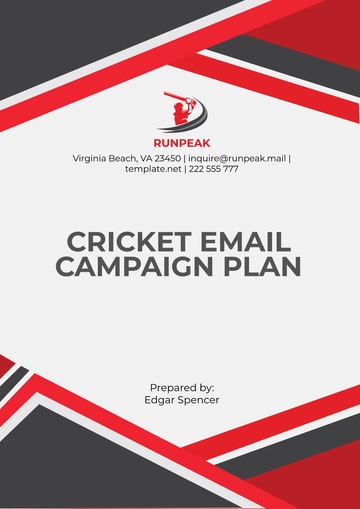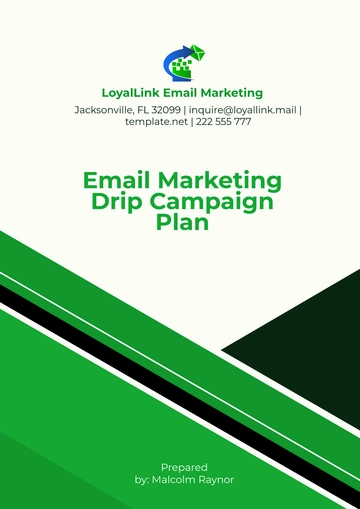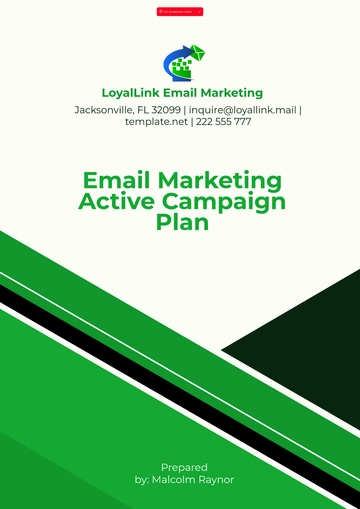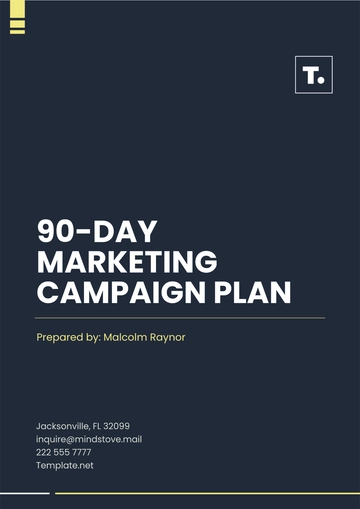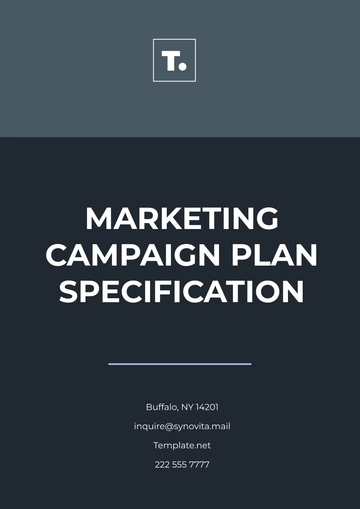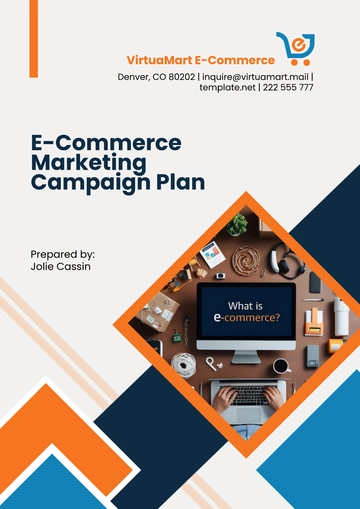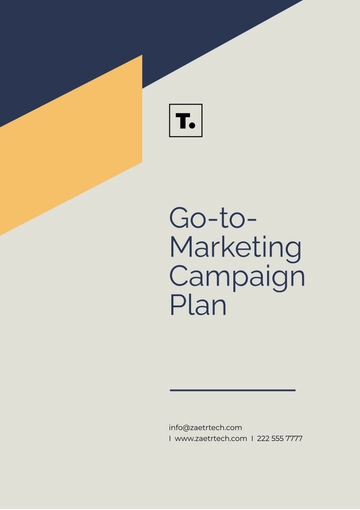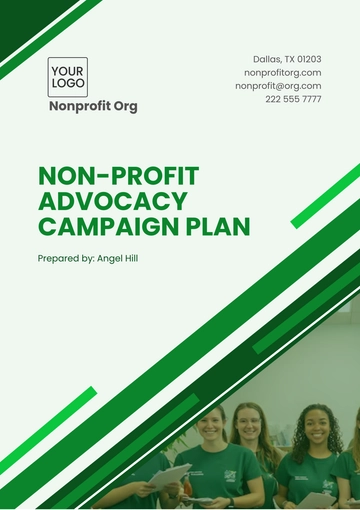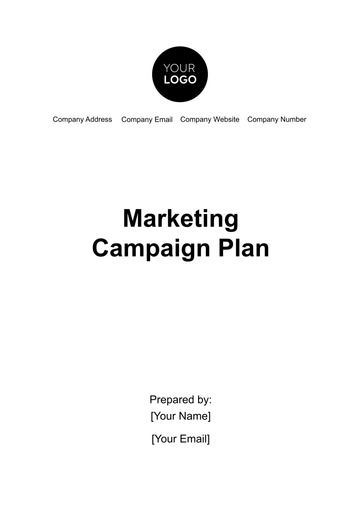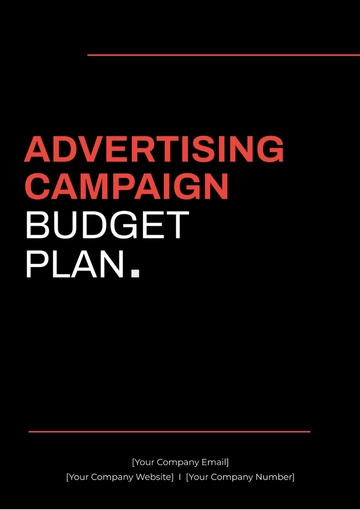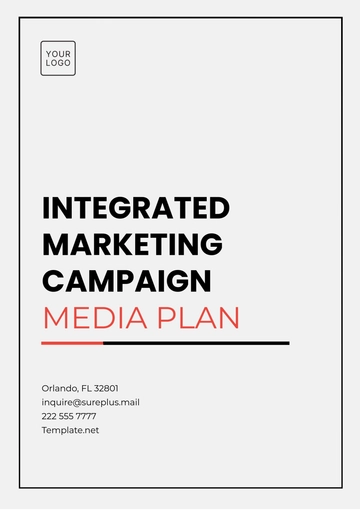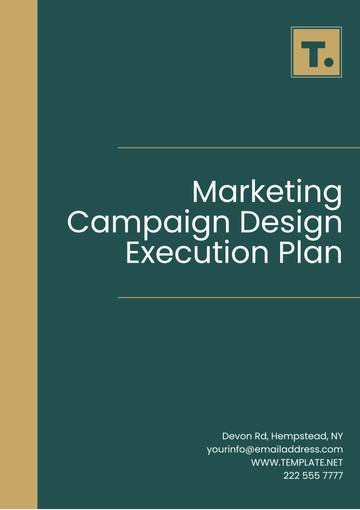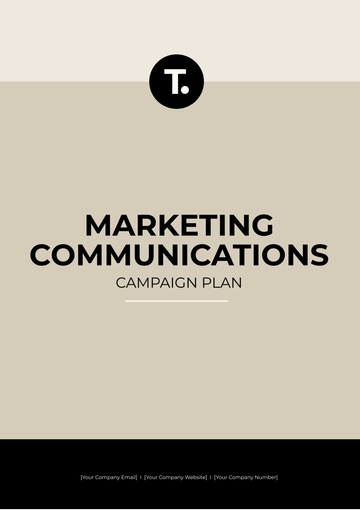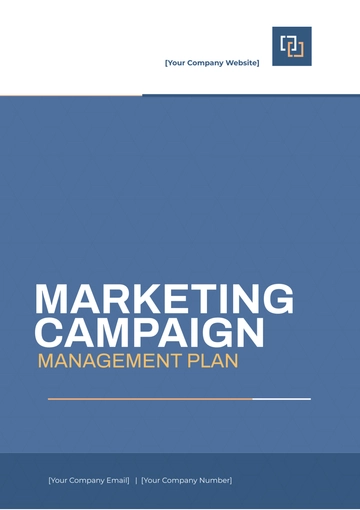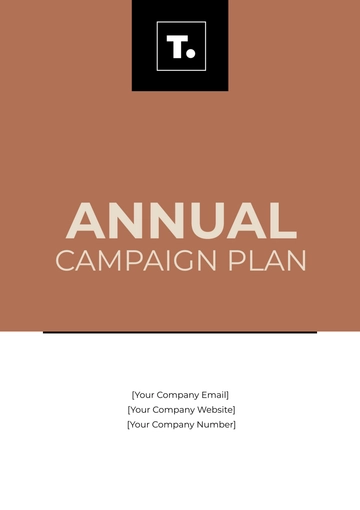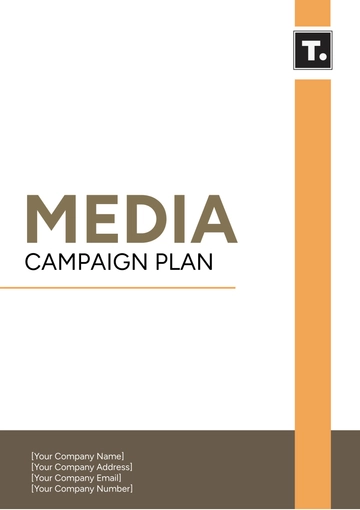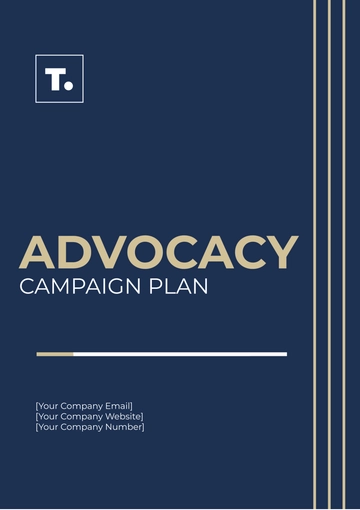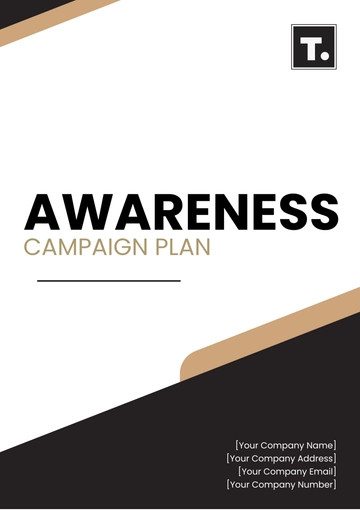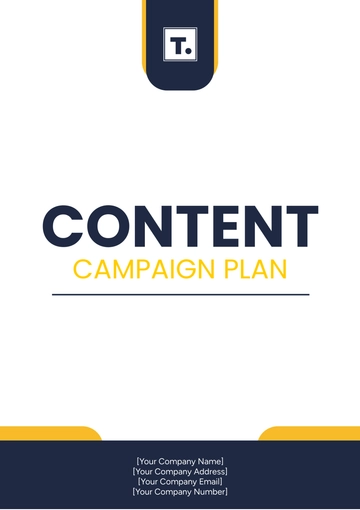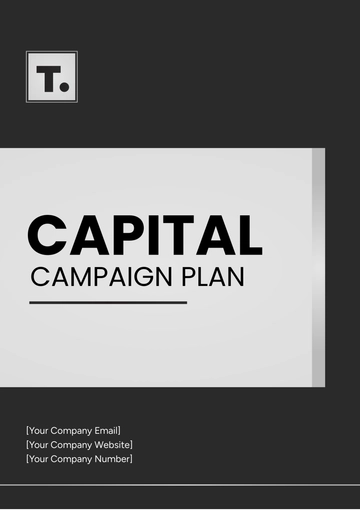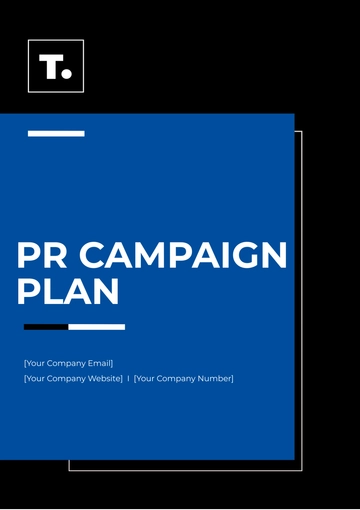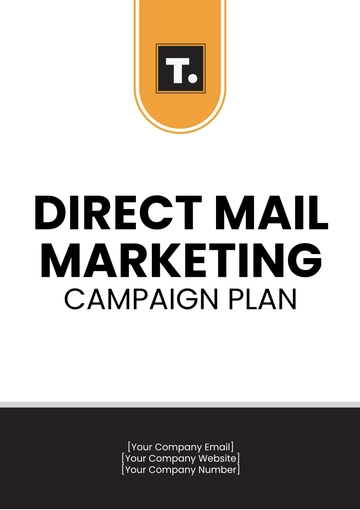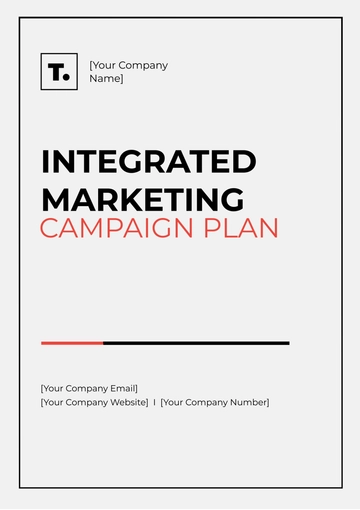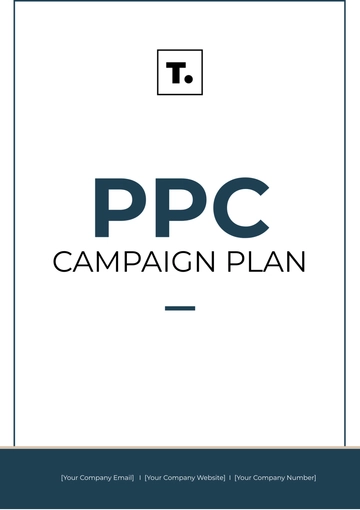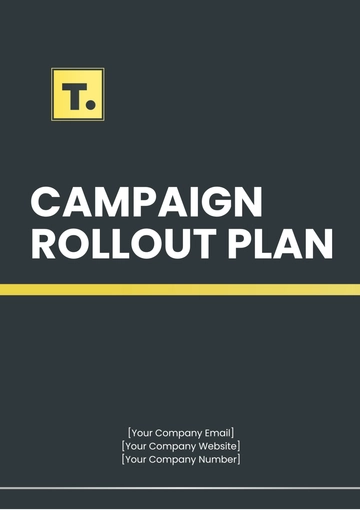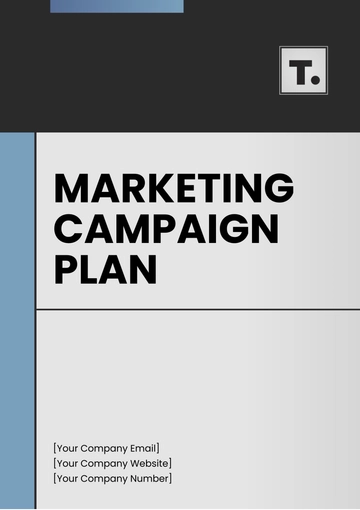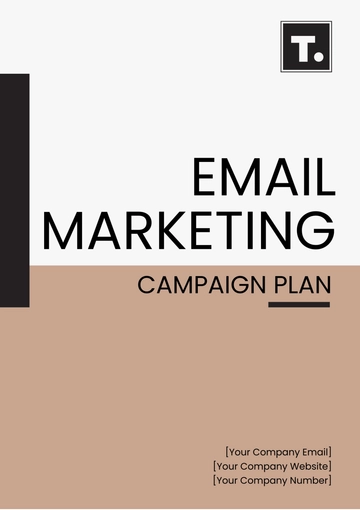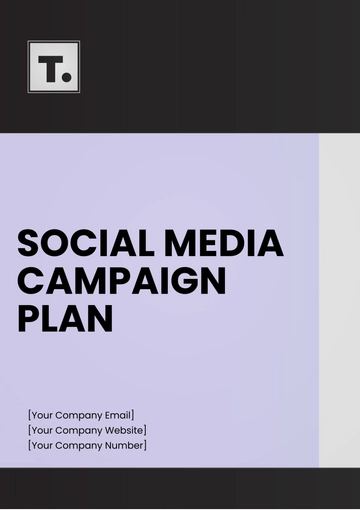Free Marketing Campaign Plan
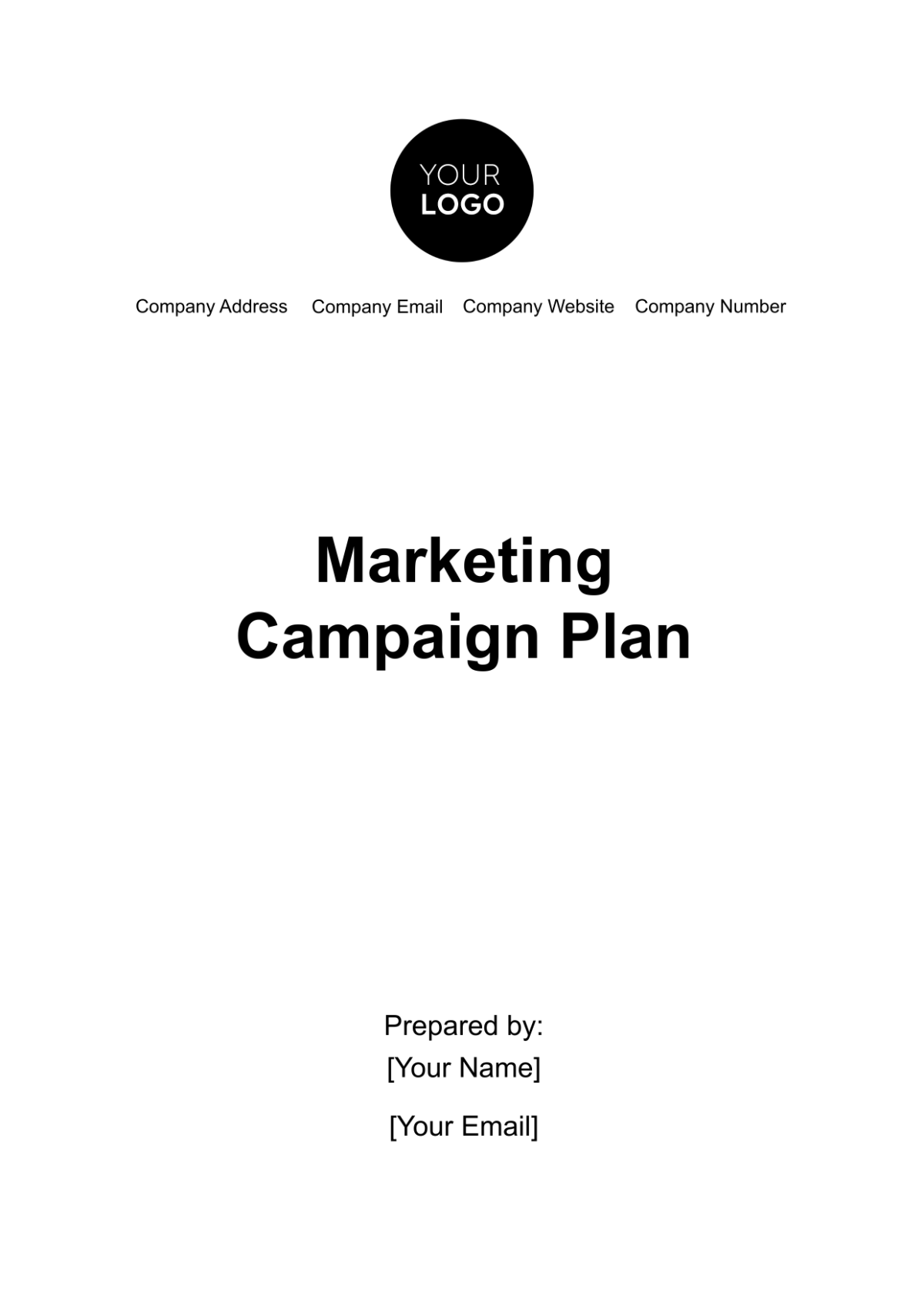
I. Executive Summary
This Marketing Campaign Plan outlines a strategic approach for [Your Company Name] to launch a focused marketing campaign aimed at increasing brand awareness, generating leads, and driving sales during the first half of [2050]. The campaign will leverage digital platforms, content marketing, and strategic partnerships to achieve its objectives.
A. Campaign Overview
The primary goal of this campaign is to position [Your Company Name] as a leading marketing solutions provider in the technology, healthcare, and e-commerce sectors. The campaign will run from [Month Day, Year] to [Month Day, Year], with targeted efforts to attract new clients, engage existing customers, and enhance brand visibility.
B. Key Objectives
Increase Brand Awareness by [40%] in Target Markets: The primary objective is to significantly elevate the visibility of [Your Company Name] within its target markets, specifically the technology, healthcare, and e-commerce sectors. By increasing brand awareness by [40%], the goal is to ensure that a larger portion of the target audience recognizes and associates the company with high-quality marketing solutions.
Generate [500] Qualified Leads by the End of [Q2 2050]: The campaign aims to generate [500] qualified leads within the first two quarters of [2050]. This objective will be met by implementing targeted lead generation tactics, such as personalized email marketing, content downloads (like whitepapers and case studies), and interactive webinars.
Achieve a 25% Increase in Sales Conversions from the Campaign Efforts: The objective is to achieve a [25%] increase in sales conversions as a direct result of the campaign activities. By optimizing the sales funnel and ensuring that potential clients are nurtured effectively, [Your Company Name] aims to turn more inquiries into contracts, thereby boosting revenue.
Enhance Engagement on Social Media Platforms by [50%]: The goal is to enhance engagement on platforms like LinkedIn, Twitter, and Instagram by [50%]. To achieve this, the campaign will focus on creating high-quality, relevant, and interactive content that resonates with the target audience. Additionally, the use of sponsored posts and targeted ads will help increase reach and interaction.
II. Target Audience
Understanding the target audience is crucial for the success of the marketing campaign. This section details the specific audience segments that [Your Company Name] will target, including their demographics, behaviors, and needs.
Technology Sector:
Demographics: Tech startups and established companies, primarily located in urban areas, with decision-makers aged [30-50].
Behaviors: Highly active on digital platforms, value innovation and data-driven solutions, prefer personalized marketing approaches.
Needs: Advanced marketing strategies, digital transformation support, and lead generation solutions.
Healthcare Sector:
Demographics: Healthcare providers, pharmaceutical companies, and medical device manufacturers, with decision-makers aged [35-55].
Behaviors: Focused on compliance and ethical marketing, value trust and credibility, engaged in professional networks.
Needs: Specialized marketing strategies, patient engagement solutions, and reputation management.
E-commerce Sector:
Demographics: Online retailers, e-commerce platforms, and digital marketplace operators, with decision-makers aged [25-45].
Behaviors: Data-driven, highly competitive, value customer experience and conversion optimization.
Needs: Customer engagement strategies, conversion rate optimization, and performance marketing.
III. Campaign Strategies
The success of the marketing campaign depends on the implementation of effective strategies tailored to the needs and behaviors of the target audience. This section outlines the key strategies that will be employed to achieve the campaign objectives.
A. Digital Marketing Strategy
SEO and SEM Campaigns: Increase organic and paid search visibility for key services offered by [Your Company Name]. Optimize website content for search engines, implement targeted Google Ads campaigns, and use data analytics to refine keywords.
Social Media Marketing: Enhance brand engagement and awareness on social media platforms. Create and share high-quality content on LinkedIn, Twitter, and Instagram, run sponsored ads to reach broader audiences, and engage with followers through interactive posts and polls.
Email Marketing: Nurture leads and maintain engagement with existing clients. Develop personalized email campaigns with segmented lists, automate follow-up sequences, and provide valuable content through newsletters.
B. Content Marketing Strategy
Thought Leadership Content: Establish [Your Company Name] as an industry leader and trusted source of marketing knowledge. Publish whitepapers, case studies, and blog posts on emerging marketing trends, host webinars featuring industry experts, and distribute content through owned and third-party platforms.
Video Marketing: Increase audience engagement and showcase expertise in a visually appealing format. Produce tutorial videos, client testimonials, and behind-the-scenes content, distribute videos on social media and YouTube, and incorporate video into email marketing campaigns.
Webinars and Online Workshops: Provide value to potential clients and demonstrate [Your Company Name]’s capabilities. Host monthly webinars on relevant marketing topics, invite guest speakers from the industry, and use webinars as a lead generation tool.
C. Partnership Strategy
Strategic Alliances: Expand market reach and enhance credibility through partnerships. Partner with industry influencers, collaborate on joint marketing initiatives, and co-host events and webinars.
Referral Programs: Increase client acquisition through word-of-mouth and referrals. Implement a referral program offering incentives to existing clients who refer new business, promote the program through email and social media channels.
Co-marketing Campaigns: Leverage shared resources and audiences to maximize impact. Collaborate with complementary businesses to create joint content, cross-promote services, and share leads generated from co-branded campaigns.
IV. Campaign Timeline
A detailed timeline is essential for the successful execution of the marketing campaign. This section outlines the key activities and milestones for the campaign, ensuring that all tasks are completed on time and within budget.
Date | Activity | Details |
|---|---|---|
[Month Day, Year] | Campaign Launch | Kick-off meeting, finalize strategy, and start digital campaigns. |
[Month Day, Year] | Content Creation and Distribution | Publish blog posts, whitepapers, and case studies. |
[Month Day, Year] | Social Media and Email Marketing | Launch social media ads, begin personalized email sequences. |
[Month Day, Year] | Webinar Series Launch | Host the first webinar, promote through all channels. |
[Month Day, Year] | Partnership and Co-marketing Initiatives | Launch joint campaigns with strategic partners. |
[Month Day, Year] | Campaign Evaluation and Adjustment | Review performance metrics, adjust strategies as needed, and prepare for Q3 activities. |
This timeline ensures that the campaign remains on track, with each phase building on the previous one to maximize impact. The timeline also allows for regular evaluation and adjustments to optimize performance.
V. Budget Allocation
A clear budget allocation is essential to ensure that the marketing campaign is executed efficiently and effectively. This section provides a breakdown of the campaign budget, with resources allocated to each key activity.
Category | Budget Allocation | Details |
|---|---|---|
Digital Marketing | $150,000 | Includes SEO, SEM, social media ads, and email marketing. |
Content Marketing | $100,000 | Covers content creation, video production, and webinar hosting. |
Partnerships | $50,000 | Budget for strategic alliances, referral programs, and co-marketing initiatives. |
Marketing Technology | $25,000 | Investment in marketing automation tools and analytics platforms. |
Contingency Fund | $25,000 | Reserve fund for unforeseen expenses or additional marketing activities. |
Total Campaign Budget | $350,000 | Total estimated cost for executing the marketing campaign. |
The budget allocation is designed to ensure that each aspect of the campaign is adequately funded, with a focus on digital and content marketing. The contingency fund provides flexibility to address any unexpected challenges.
VI. Performance Metrics
Measuring the success of the marketing campaign is crucial to understanding its impact and identifying areas for improvement. This section outlines the key performance indicators (KPIs) that will be used to evaluate the campaign’s effectiveness.
A. Digital Marketing Metrics
Website Traffic: Measure the increase in website visits, particularly from targeted sources such as search engines and social media.
Lead Conversion Rate: Track the percentage of website visitors who convert into leads through forms, downloads, or contact requests.
Social Media Engagement: Monitor the growth in followers, likes, shares, and comments on social media platforms.
B. Content Marketing Metrics
Content Reach: Evaluate the number of views, downloads, and shares of content such as blog posts, whitepapers, and videos.
Webinar Attendance: Track the number of attendees for each webinar, as well as the engagement and feedback received.
SEO Performance: Monitor keyword rankings, organic traffic growth, and search engine visibility.
C. Partnership Metrics
Referral Traffic: Measure the traffic and leads generated through referral programs and co-marketing campaigns.
New Client Acquisition: Track the number of new clients acquired through partnerships and strategic alliances.
Joint Campaign Success: Evaluate the performance of co-marketing initiatives, including lead generation and brand awareness.
D. Financial Metrics
Cost Per Lead (CPL): Calculate the average cost of acquiring a lead through the campaign activities.
Return on Investment (ROI): Assess the overall return on investment by comparing the campaign’s costs to the revenue generated.
Revenue Growth: Track the increase in revenue attributed to the campaign efforts, with a focus on meeting the target of a [25%] increase in sales conversions.
VII. Risk Management
Identifying and mitigating potential risks is essential for the successful execution of the marketing campaign. This section outlines the key risks associated with the campaign and the strategies that will be employed to manage them.
Budget Overruns:
Risk: The campaign may exceed the allocated budget due to unforeseen expenses or increased costs.
Mitigation: Regularly monitor expenses, implement cost controls, and maintain a contingency fund to cover any additional costs.
Low Engagement or Conversion Rates:
Risk: The campaign may not generate the expected level of engagement or conversions.
Mitigation: Continuously monitor performance metrics, adjust strategies in real-time, and A/B test different approaches to optimize results.
Negative Publicity or Reputation Damage:
Risk: The campaign could inadvertently cause negative publicity or harm the company’s reputation.
Mitigation: Implement a crisis management plan, monitor social media and public sentiment, and respond promptly to any issues that arise.
Technical Issues or Platform Failures:
Risk: Technical issues with digital platforms or marketing tools could disrupt the campaign.
Mitigation: Use reliable technology providers, conduct regular system checks, and have backup solutions in place to address any technical failures.
VIII. Conclusion
The marketing campaign plan for [Your Company Name] is a well-structured strategy designed to increase brand awareness, generate leads, and drive sales during the first half of [2050]. With careful planning, execution, and monitoring, this campaign will contribute to [Your Company Name]'s overall success and long-term sustainability. The focus on continuous optimization and risk management will ensure that the campaign meets its objectives and delivers a strong return on investment.
- 100% Customizable, free editor
- Access 1 Million+ Templates, photo’s & graphics
- Download or share as a template
- Click and replace photos, graphics, text, backgrounds
- Resize, crop, AI write & more
- Access advanced editor
Execute successful campaigns with our Marketing Campaign Plan Template from Template.net. Fully customizable and editable, this template offers a strategic and organized design. Easily personalize the plan, editable in our Ai Editor Tool, to outline campaign goals, target audiences, and key messaging. Enhance your campaign planning with a clear and detailed template.
You may also like
- Finance Plan
- Construction Plan
- Sales Plan
- Development Plan
- Career Plan
- Budget Plan
- HR Plan
- Education Plan
- Transition Plan
- Work Plan
- Training Plan
- Communication Plan
- Operation Plan
- Health And Safety Plan
- Strategy Plan
- Professional Development Plan
- Advertising Plan
- Risk Management Plan
- Restaurant Plan
- School Plan
- Nursing Home Patient Care Plan
- Nursing Care Plan
- Plan Event
- Startup Plan
- Social Media Plan
- Staffing Plan
- Annual Plan
- Content Plan
- Payment Plan
- Implementation Plan
- Hotel Plan
- Workout Plan
- Accounting Plan
- Campaign Plan
- Essay Plan
- 30 60 90 Day Plan
- Research Plan
- Recruitment Plan
- 90 Day Plan
- Quarterly Plan
- Emergency Plan
- 5 Year Plan
- Gym Plan
- Personal Plan
- IT and Software Plan
- Treatment Plan
- Real Estate Plan
- Law Firm Plan
- Healthcare Plan
- Improvement Plan
- Media Plan
- 5 Year Business Plan
- Learning Plan
- Marketing Campaign Plan
- Travel Agency Plan
- Cleaning Services Plan
- Interior Design Plan
- Performance Plan
- PR Plan
- Birth Plan
- Life Plan
- SEO Plan
- Disaster Recovery Plan
- Continuity Plan
- Launch Plan
- Legal Plan
- Behavior Plan
- Performance Improvement Plan
- Salon Plan
- Security Plan
- Security Management Plan
- Employee Development Plan
- Quality Plan
- Service Improvement Plan
- Growth Plan
- Incident Response Plan
- Basketball Plan
- Emergency Action Plan
- Product Launch Plan
- Spa Plan
- Employee Training Plan
- Data Analysis Plan
- Employee Action Plan
- Territory Plan
- Audit Plan
- Classroom Plan
- Activity Plan
- Parenting Plan
- Care Plan
- Project Execution Plan
- Exercise Plan
- Internship Plan
- Software Development Plan
- Continuous Improvement Plan
- Leave Plan
- 90 Day Sales Plan
- Advertising Agency Plan
- Employee Transition Plan
- Smart Action Plan
- Workplace Safety Plan
- Behavior Change Plan
- Contingency Plan
- Continuity of Operations Plan
- Health Plan
- Quality Control Plan
- Self Plan
- Sports Development Plan
- Change Management Plan
- Ecommerce Plan
- Personal Financial Plan
- Process Improvement Plan
- 30-60-90 Day Sales Plan
- Crisis Management Plan
- Engagement Plan
- Execution Plan
- Pandemic Plan
- Quality Assurance Plan
- Service Continuity Plan
- Agile Project Plan
- Fundraising Plan
- Job Transition Plan
- Asset Maintenance Plan
- Maintenance Plan
- Software Test Plan
- Staff Training and Development Plan
- 3 Year Plan
- Brand Activation Plan
- Release Plan
- Resource Plan
- Risk Mitigation Plan
- Teacher Plan
- 30 60 90 Day Plan for New Manager
- Food Safety Plan
- Food Truck Plan
- Hiring Plan
- Quality Management Plan
- Wellness Plan
- Behavior Intervention Plan
- Bonus Plan
- Investment Plan
- Maternity Leave Plan
- Pandemic Response Plan
- Succession Planning
- Coaching Plan
- Configuration Management Plan
- Remote Work Plan
- Self Care Plan
- Teaching Plan
- 100-Day Plan
- HACCP Plan
- Student Plan
- Sustainability Plan
- 30 60 90 Day Plan for Interview
- Access Plan
- Site Specific Safety Plan
